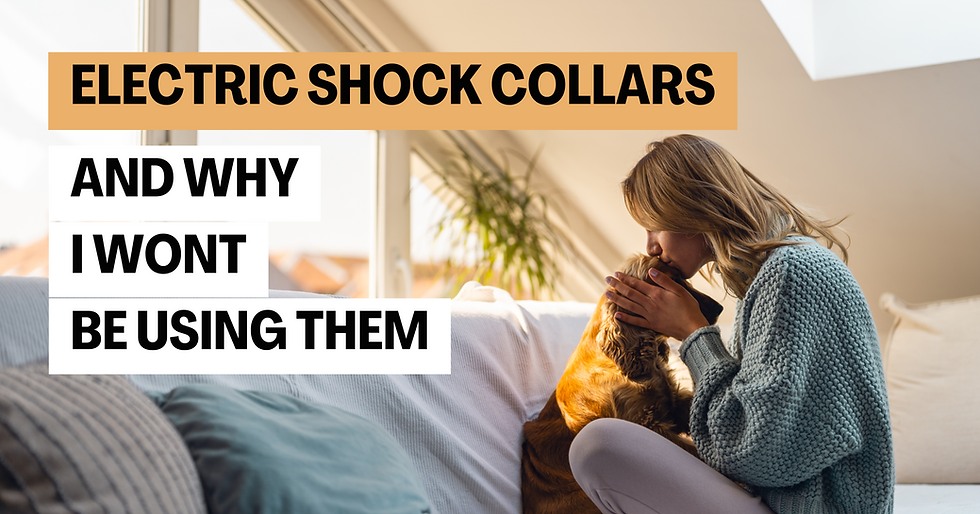Are dog training collars humane?
- Heulwen Jenkins
- Oct 24, 2024
- 3 min read

One question I hear often from dog owners is, “Should I use a shock collar to stop unwanted behaviours?” It’s a tempting solution, especially when you’re dealing with a high-energy or reactive dog. I understand the appeal—when your dog pulls so hard that they choke themselves or spins in circles when they see another dog, it can feel like you’ve run out of options. However, shock collars aren’t the solution. In fact, they can cause far more harm than good. Here’s why I won’t be using one, and the alternatives I vouch for instead.
The Problem with Shock Collars
Increased Aggression and Fear:
Studies show that e-collars can lead to more reactivity and aggression. Instead of solving behavioural problems, shock-based methods often make them worse by increasing fear, anxiety, and confusion in dogs.
Not Compatible with Positive Reinforcement:
As someone who believes in positive training, using punishment-based methods like electric shocks would conflict with my approach. Fear-based tools hinder learning and can damage the bond I’ve worked hard to build with my dog.
Expert Warnings Against E-Collars:
Are dog training collars humane? Veterinary and animal welfare organisations, such as the RSPCA, strongly oppose shock collars. They emphasise that these devices are not only unnecessary but also cause physical and psychological harm, such as burns, stress, and learned helplessness.
Limited Effectiveness:
There’s no evidence suggesting shock collars are more effective than positive, reward-based methods. In fact, research shows reward-based training produces better outcomes, with fewer risks to both dogs and their owners.
Are dog training collars humane?
This is a topic of much debate in the dog training community. Some collars, such as shock collars or choke chains, can cause physical and emotional stress to dogs, which many experts consider inhumane. While these collars may temporarily stop undesirable external behaviours like barking or pulling, they do nothing to address the underlying emotions, such as fear, anxiety, or frustration, that often drive the behaviour. This means that while the behaviour may stop in the moment, the root cause remains unresolved, potentially leading to other unwanted behaviours or emotional issues down the line. In contrast, humane training methods like clicker training focus on changing the dog's emotional state through positive reinforcement, encouraging desired behaviours in a stress-free, constructive way that promotes long-term success.
Are Shock Collars Legal in Australia?
Laws on the use of electronic dog collars vary across Australia. Here’s a summary of what’s allowed:
Banned in ACT, NSW, and SA:
It is illegal to use or sell shock collars in these states, with very limited exceptions (e.g., for boundary systems in NSW).
Permitted with Restrictions in VIC, WA, and TAS:
Some states allow shock collars but under strict regulations and conditions.
Legal in NT and QLD:
There are no prohibitions in these areas, although animal welfare advocates continue to push for bans.
Given the inconsistent regulations and growing public opposition, it's clear that the trend is moving away from shock collars toward humane training methods.
What Are the Alternatives?
For dogs who struggle with reactivity around other dogs, humane alternatives can help address the issue without causing harm.
Professional Trainers and Behaviourists:
Seeking guidance from a certified behaviourist can be invaluable for understanding and addressing specific behavioural challenges.
Management
Provide stimulating enrichment at home rather than feeling the need to walk your dog out in a world that they find overwhelming. If you do take your dog on a walk, choose quieter times of the day and wider spaces where you can increase your distance from other dog owners.
Desensitisation and Counter-Conditioning:
Slowly exposing your dog to triggers (like other dogs) in a controlled way can help reduce reactivity over time. Pairing these exposures with rewards teaches your dog to associate other dogs with positive outcomes.
Final Thoughts: Why I’m Sticking to Positive Training
While it’s tempting to look for quick fixes, shock collars aren't the answer. I love my dog too much to risk harming her physically or emotionally. It’s important to me to build trust through reward-based training, even if it takes time and patience.
Every dog deserves the chance to learn in a way that makes them feel safe and confident. I’m committed to finding better solutions that align with the principles of kindness and respect. If you’re in a similar situation, know that there are many resources available—there’s always a better way than punishment.
Remember: The bond we share with our dogs is worth more than any quick-fix gadget. Let's make training an opportunity to strengthen that bond, not weaken it.
Have you dealt with reactivity issues with your dog? What methods have worked for you? Let me know in the comments!



Comments